#an unnecessary overanalysis
Text
In Defense of Gertrude McFuzz
First off, we need to get this out of the way: Gertrude McFuzz (from Seussical) is an extremely underrated character in musical theater. There, that's said and done.
As far as the analysis goes, it will follow the same format as my In Defense of Audrey post where I will be going through each song Gertrude is in and go from there. For reference, I will also be basing what songs I use off of the OBC recording from 2001.
There will be spoilers for the musical, so if you haven’t listened to it and would like to, you may want to skip it. But of you have listened to it (or don’t care about spoilers), then here we go.
Oh, The Thinks You Can Think
Gertrude's one little line in the song ("Think of a bird with a one-feather tail!") sets up her insecurity and her whole character arc (more on that further down). But it’s established right away that Gertrude has some sort of issue with her tail.
Biggest Blame Fool
Some context for this song: Horton the Elephant has just found the Whos on a little dust speck and has been talking to them. Everyone else in the Jungle of Nool, who can't hear the Whos, has started to make fun of Horton.
The Cat in the Hat (the narrator) has taken up interviewing residents and goes to Gertrude McFuzz. Gertrude introduces herself as Horton's neighbor, and that for as long as she's lived next to him, "he's never done anything crazy before". In fact, Horton has been friendly, loyal, and kind in every interaction Gertrude has had with him. Gertrude is the only one who believes Horton, and she remains loyal to him from this point and throughout the whole show.
She shows her loyalty to Horton by singing "A person's a person no matter how..." in unison with him. Immediately, the other residents of Nool ridicule the both of them.
Even though Gertrude is a bird and definitely can not hear the Whos, she believes Horton. Gertrude has every right to believe Horton has gone crazy like all the other residents say, but Gertrude remains loyal to Horton because from she knows about Horton, there isn't any reason to believe he has gone crazy. Gertrude continues to believe Horton throughout the show, even though it makes her a minority in that belief.
The One Feather Tail of Miss Gertrude McFuzz
Gertrude takes some time to lament about her one feather tail, which allows us to see more into Gertrude's insecurities and thoughts. Having one feather causes Gertrude a lot of issues and insecurity, and she's attempted to "fix" her tail a few times. She's tried to make her tail look fancy, poof it to make it look bigger, but nothing has worked.
The reason Gertrude gives for why she is so insecure about her tail is that to her, having one tail will never get Horton to like her.
A tail that simply wasn't meant
To catch the eye of an elephant
Here, it's established that Gertrude has some sort of feelings (platonic or romantic) for Horton and that her tail causes a lot of self-esteem issues.
Just a side note: I don't think it's a stretch to say that Gertrude's tail insecurity is an analogy for body insecurities.
Amayzing Mayzie
Immediately after Gertrude's little ballad, Mayzie LaBird interrupts her. Mayzie is confident, charismatic, and has a tail full of feathers. Mayzie is a direct foil to Gertrude who is insecure, awkward, and has one feather on her tail.
Mayzie sees that Gertrude is insecure about her tail, and understands. Mayzie admits that she used to only have "one pathetic feather" and that she hated it because she didn't feel confident. Throughout Mayzie's short tale, she says how "plain" and not "show-offish" she was with one feather. By doing this, Mayzie is inadvertently insulting Gertrude and saying she is plain and has nothing going for her with one feather. Mayzie actually goes on to say "and there's certainly nothing showoff-ish on you" to Gertrude.
Mayzie goes on to say that she went to a doctor to help her grow more feathers. It ended up helping Mayzie to be more confident-- something Gertrude wants and aspires to be.
Gertrude starts to compliment and be envious of how fabulous Mayzie's tail is and how much she'd like to have one like it. Mayzie encourages Gertrude to go to the doctor so Gertrude can be (almost as) amazing as Mayzie.
Amayzing Gertrude
Gertrude, feeling that it is her only shot to get Horton to like her, goes to Dr Dake to get pills to make her tail grow. Dr Dake explains that for Gertrude's type of bird, having one feather is completely normal. Gertrude doesn't want to hear it and demands the doctor to help her grow more feathers. Dr Dake gives in and gives Gertrude the pills.
As Gertrude takes the pills, she starts to feel itchy and strange, until she notices more feathers growing on her. Seeing the feathers gives Gertrude immense joy and happiness and she calls herself Amazing Gertrude and exclaims:
And hopefully I'll impress Horton!
At this point in Gertrude's storyline, it is following very closely to the Ugly Duckling Transformation in many movies and shows. Gertrude is insecure and doesn't have the traditional bird-look like Mayzie. While there's nothing wrong with finding a way to be more confident in yourself in order to help you talk to someone you like/want to befriend, it is a problem when movies and media depict it as a girl changing her appearance and personality in order to appease a guy she likes. It's not as if she's changed over time through development, but a quick montage of her physically changing to appear "more attractive". And in most of those montages, the girl has a style that has nothing to do with who she is (like near the end of The Breakfast Club), almost like she had no say in it.
At least in this instance, Gertrude did have some say and choice in her transformation. But mostly, Gertrude had pressure from Mayzie to "Get those pills" (as Mayzie says it) for Gertrude to be more confident. And getting feathers isn't like Mayzie is giving Gertrude a whole new look that's completely different to who Gertrude is. Mayzie is just telling Gertrude to do the same thing that helped Mayzie when she was in Gertrude's position.
Later in the show, Seussical flips the Ugly Duckling Transformation trope on its head, but for now, it's just following the same plot.
Notice Me, Horton
This is Gertrude's moment to shine. The time she gets to swoon Horton with her declaration of love and full tail that she just acquired. She's full of confidence and ready to tell Horton how she truly feels. Gertrude hopes that Horton will look past being the "odd little next-door neighbor".
She says she doesn't have much as appearances goes (she has small eyes, big feet, and a pitiful tweet), but at least she has a full tail.
I'd also like to include the cut verse from Seussical that I think adds to Gertrude. The cut verse has:
No one’s ever looked twice at Ms. Gertrude McFuzz.
But this tail makes me almost twice as I was.
And I did it for you, so you’d notice me more.
It's a shame the verse was cut because it really brings out Gertrude's character. As the verse says, she's been largely ignored and gone unnoticed, but now Gertrude believes she can get noticed by Horton and she admits she got a bigger tail just so Horton would notice her.
Gertrude continues to beg Horton to notice her, but Horton is busy trying to find the Who Clover (the clover Horton put the Whos on) that Vlad Vladikoff threw into a larger field of clovers. She begs him to stop looking at the clovers and notice her, but Horton doesn't hear her. They both end up singing:
I was just a no one only yesterday
You showed up and showed me something more
Now I've become a someone
Who has someone to believe in
And to be there for
Horton is singing to the Whos. Gertrude is singing it to Horton. They're both singing about how someone (or multiple people) have changed their lives. Horton has changed Gertrude's life and she wants to tell him that. Although Horton hasn't noticed her yet, Gertrude isn't ready to give up. She tells Horton that the reason she started to like Horton was because she admired his kindness and compassion.
She tries once again to get Horton to notice her, repeating "notice me, Horton" three times. Each time, she gets more and more desperate, until she gives up and leaves.
This is where the show flips the Ugly Duckling Transformation trope on its head. Traditionally, this is the part of the story where after the girl has undergone The Transformation, the boy notices her and likes her back. But in Seussical, it doesn't happen. Even though Gertrude has undergone The Transformation, Horton doesn't notice her.
Horton Sits on the Egg / Act I Finale
At this point in the show, Horton has agreed to take care of Mayzie's egg for a bit, but he is in danger from hunters. He calls for help, and the only one around to help him is Gertrude.
Gertrude tries to help Horton as he is being kidnapped by the hunters, but when she tries to fly, she is unable to because of how long her tail is. This causes more problems for Gertrude because while she wants to have a full tail to impress Horton, she wants to be able to help Horton more.
All For You
Gertrude is mostly absent for the majority of Act II, but shows up right at the tail end. She arrives--with a one feather tail-- and has found Horton at the circus and plans to get him out. It's clear that Gertrude has found confidence in herself over the course of her journey as she says:
I bet you (the audience) forgot about Ms. Gertrude McFuzz. That's nothing new, I mean everyone does. Yet Gertrude did something that few birds could do. So here's the Tale of Miss Gertrude: Part 2!
She pokes a bit of fun at herself, but she lets everyone know that she has something new up her sleeves (or feathers, whatever you prefer).
Gertrude tells Horton how she got here. She talks about her giant tail that she grew to have him notice her, but admits that while it was attractive, it was silly to grow it so large because she couldn't fly--the thing birds are supposed to do. She especially notices that it was foolish to grow such a large tail when Horton was taken by the hunters and was unable to help right away.
And I got so very frightened 'cause I knew I had to save you
No one else was gonna go to all the labor
It was all up to me
All you had was your next door neighbor
Gertrude isn't trying to pat herself on the back or trying to get Horton to like her for her efforts. She's stating a fact. Gertrude is the only one who willingly would go out of her way to find Horton and help him, unlike everyone else who just let him go and didn't care. She decides to help Horton because she cares about him and wants him to come back home.
But first, she had to go back to Dr Dake and get rid of her tail so she could fly. After that, she traversed through the jungle. But that wasn’t any easy task for one bird. She got met with bees, thick fog, almost fell down a giant slope, went through freezing temperatures, caught the flu, tripped and fell down a hill, fell into water, sprained her toe, and injured a leg. She went through all of those obstacles for what? For Horton. She would have gone through anything and everything for him because she cares for Horton.
On top of that, Gertrude also spent seven weeks searching for the Whos Clover and carried it with her. She knew the Whos were important to Horton and made sure to find them.
She did all of it because Horton has "always been friendly and loyal and kind". He stayed loyal to the Whos, even though everyone thought he was crazy. He stayed loyal to Mayzie's egg, even though it got him kidnapped. Horton has always been selfless, and it was time someone did something for him. And that's exactly what Gertrude did.
Like Notice Me Horton, All For You is Gertrude's confession of her feelings for Horton. Notice Me Horton is the simple love song and interaction as other similar storylines have, but in this story, it doesn't work for Gertrude because it was her telling Horton she cares about him, rather than showing it. All For You is Gertrude displaying and showing how much she cares for Horton (with a declaration of how much she cares for him at the end).
Gertrude expresses genuine feelings in both songs, but All For You aligns better with both Horton and Gertrude's personalities. All For You works because Horton isn't busy trying to find a clover and, more importantly, because Horton values showing compassion for others. Gertrude displays her compassion for Horton by taking care of the Whos, because that's what he wanted to do all along. And because Gertrude cares so much about Horton, she went to find him when no one else would. When she finishes the song, that's when Horton notices Gertrude, and it works because Gertrude did all those things because she wanted to, not expecting Horton to have a certain reaction it.
The People Versus Horton the Elephant
After Gertrude and Horton are reunited, Horton is put in court for loitering on an egg, talking to a speck, and disturbing the peace.
All the residents of Nool testify against Horton, except Gertrude. Gertrude remains loyal to Horton and acts as his lawyer to defend him. Gertrude and Horton, together, support and defend the Whos as the clover of Whos is about to be boiled.
Finale / Oh, The Thinks You Can Think!
When every citizen of Nool hears the Whos, Horton and Gertrude declare that there are persons on the speck. This changes the resident's minds and they promise to protect the Whos as well.
Then, Mayzie's egg begins to hatch and out pops an elephant-bird (weird implications, but okay). Horton becomes worried that he won't be able to take care of the baby properly. Since Horton cannot fly, he won't be able to nurture the baby and fulfill all its needs (especially in the flying aspect). Gertrude reassures Horton that she will help him raise the baby by telling him:
I have wings,
Yes, I can fly!
You teach him earth,
And I will teach him sky!
Since Gertrude has wings, she can help the baby to fly, and Horton can help it walk. Together, they will be able to nurture all of the baby's needs properly.
#seussical#gertrude mcfuzz#seussical the musical#an unnecessary overanalysis#overanalyzing characters with bugs
35 notes
·
View notes
Text
GUMY DOES UNNECESSARY ANALYSIS ON A BOOK HER 10 YEAR OLD SISTER MADE HER READ: THE RANT
my younger sister recently finished the book Jinxed by Amy McCulloch, and she decided in her infinite ten-year-old wisdom that I would really enjoy the book. i read it cover to cover and need to tell someone other than her my thoughts bc she likes the book a lot and I don’t want to make her feel bad for liking it. so, my thoughts under the read more
First, I should explain the book’s premise. it’s sci-fi kid’s fiction, and yes, that does mean I’m being anal over children’s literature for no reason. im fully aware. i just like being nitpicky, and analyzing exactly what elements you like or dislike in a story and why is a very valuable skill to have. BUT YEAH. In this book, everyone owns a “baku,” a customizable robotic animal that is basically a cross between a smartphone and a digital home assistant.
Lacey, the Main Character Girl (she is 12 btw so keep that in mind) stumbles across a damaged baku and repairs it herself. she then goes to the official Nerd School, sponsored and run by The One Big Apple-Stand-in Which Has Completely Monopolized Baku Technology (literally nobody is suspicious of this at all). however, her cat baku, Jinx, is not like the other bakus- he’s autonomous.
honestly, the story’s pretty ok. not perfect by any means, but not necessarily bad. yeah it’s cliche. yeah, there’s an unnecessary romance subplot. yeah, the group of friends is not given any sort of proper buildup to justify the friendship levels. it’s a kid’s book, and the relationship between the two main characters is decent enough (although still somewhat lacking). it’s not the story I’m annoyed with.
THE WORLDBUILDING AND TONE HOWEVER, HAVE NO EXCUSE! one look inside this book told me it had a #girlboss Let’s Get Women Into STEM! message, with healthy dashes of “kids and their cellphones” and there is neither subtlety nor any sort of reconciliation of these ideas! it should not take more than half the book before even one character expresses the thought that maybe the tech conglomerate that literally takes over and owns entire company towns all over North America, might not have everyone’s best interests at heart! even then, the corruption is alluded to be because of one singular guy, instead of, i don’t know, a flaw in the system of entire education systems being owned by one megacorp from the ground up!
and let’s not even get started on the implication that asking for help makes you a worse engineer.
the worldbuilding is about as shaky as jello on a fault line, btw, bc there is 1) little if any cohesion between worldbuilding elements, 2) bootlicky exposition on already-explained topics which does not add anything at all, and 3) a corresponding lack of development into other introduced parts of the world, including but not limited to the pokemon-style baku deathmatches that middle-school children compete in and are forbidden by NDA to tell even their parents about.
furthermore (this one’s really nitpicky btw just annoying to me) despite willy wonka and the chocolate factory being directly referenced, our “Charlie” characters trust the obvious Slugworth copy, and the opposing megacorp he represents, to have their best interests at heart as well.
0 notes
Text
What it means to have a dream- Parallels between Hua Cheng and Bai Wuxiang (overanalysis extravaganza)
Exposition (AKA story funtime! also unnecessary for the rest of this post): So I was surfing the internet, as one does, and I found this TGCF T-shirt that said "my objective is only you" with the cry-smiling face on it. Now I didn't remember this line and thought it was an alternate translation of Hua Cheng's line, "If your dream is to save the common people, then my dream is only you", but that seemed like the worst alternate translation someone could've gone for, with the worst possible symbol no less! So I looked it up and yeah, I rediscovered Bai Wuxiang's line, "My objective isn't to 'lead you away'. My objective is only you." AND NOW I HAVE THOUGHTS ON THAT-!!!
-|-
"My objective isn't to 'lead you away'. My objective is only you."- Bai Wuxiang (book 4, before the 100-swords incident)
"If your dream is to save the common people, then my dream is only you."- Hua Cheng (book 5, before shattering into butterflies)
So...these both sound pretty similar, right? Not just to me? I don't think it's a coincidence that Hua Cheng says this in his book 5 when he's referencing some of the most key points in all the other books, and at first glance to me this was just a reference to Xie Lian's childhood dream to save the common people. However, looking at these 2 together, I think "objective" and "dream" make for a very interesting contrast. They both mean very similar things in context- when you have a dream, goal, aspiration, objective. However, 'dream' is a broader, more idealistic term than 'objective', wherein the latter has heavy connotations of a means to an end. Xie Lian is something that Bai Wuxiang uses as a tool to get what he wants. Be it satisfaction, catharsis or vindication (not sure I have clear-cut thoughts on his motivations honestly), Xie Lian's life is a series of tasks to be completed to get what he wants. Conversely, Xie Lian is someone Hua Cheng wants to be worthy for...a dream is usually something more personal than an objective- it is something you want but know you might not be able to get, and is something to aspire for rather than finish off, and when you make it, there's happiness that comes with it because of the thing itself and not the fact it has been 'completed'. To put it one way atleast, Xie Lian dreams to cease the suffering of humanity, but has grown to exclude himself from the equation of who he values helping. And Hua Cheng just dreams to cease the suffering of Xie Lian.
There's also a focus from Hua Cheng on what Xie Lian wants that is made clear throughout the novels, and the use of 'dream' also makes me think of that, because a dream is an ideal and not a fundamental. Hua Cheng's dream hinges on Xie Lian and Xie Lian's dreams, while Bai Wuxiang's objective is to change Xie Lian based on his own desires. In the same scene in book 4, he tries to change that very dream: “You want to save the common people, do you? The common people don’t need to be saved by you. They aren’t worthy.” He says this, and then immediately uses the 100-swords scene to prove his point, all of this without taking into account what Xie Lian wants at all. Hua Cheng on the other hand says, in the same scene as he shatters into butterflies:
"If I could, I would have you use me as your stepping stone, the bridge you take apart after crossing, the corpse bones you need to trample to climb up, the sinner who deserved the butchering of a million knives. But, I know you wouldn’t allow it."
But, I know you wouldn't allow it. He would offer himself up for the 100-swords scene to save Xie Lian, hands down, but knowing Xie Lian does not want Hua Cheng to do that, does not want Hua Cheng to be used by himself: this is what stops Hua Cheng from hypothetically doing that. He wouldn't take that decision away from Xie Lian in any way, and even if he HATED Xie Lian's opinion he wouldn't want to force him to do/think anything. Even when Xie Lian would've been powerless to stop him, Hua Cheng respects Xie Lian's autonomy in a way Bai Wuxiang doesn't, seeing him as an 'objective'.
All of these are recurring themes throughout TGCF, but it fascinates me how intricately the parallels can go. Even with just these 2 lines, you can analyse for fundamental differences between Bai Wuxiang and Hua Cheng's characters and how they relate to Xie Lian. Both of them have been written to parallel Xie Lian, and each other, but you can understand them so clearly not just from the overarching plot but down to the details of the dialogue.
#tgcf#tgcf meta#analysis time by me so I can track them in my tags#hualian#hua cheng#bai wuxiang#white no face#xie lian#tgcf book 5#tgcf book 4#posts originating from my brain
44 notes
·
View notes
Text
Overthinking: Understanding and Overcoming the Habit

Overthinking is a common yet often overlooked habit that can significantly impact our mental well-being and productivity. It involves obsessively analyzing situations, dwelling on past events, and worrying excessively about the future. While everyone experiences moments of deep thought, overthinking becomes problematic when it leads to anxiety, indecision, and mental fatigue.
What Causes Overthinking?
- Perfectionism: Striving for perfection can lead to overanalyzing every detail, fearing mistakes, and feeling overwhelmed by high expectations.
- Fear of Failure: The fear of making mistakes or failing can trigger a cycle of overthinking as we try to anticipate and avoid potential pitfalls.
- Lack of Control: Feeling out of control in a situation can lead to overthinking as we try to regain a sense of security through excessive planning and analysis.
- Negative Self-Talk: Harsh self-criticism and negative self-talk can fuel overthinking by magnifying doubts and creating a constant inner dialogue of worry.
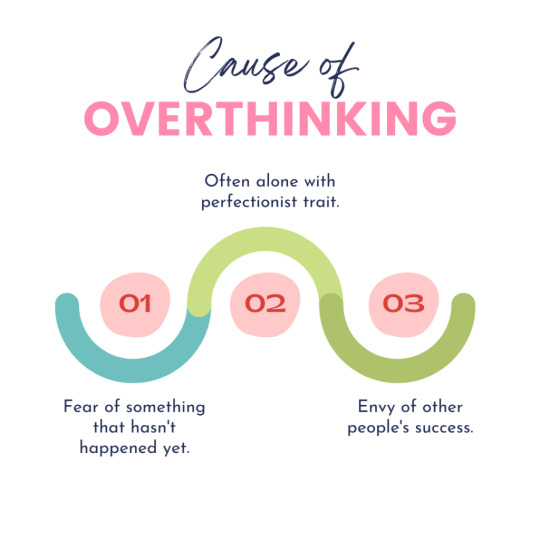
The Impact of Overthinking
- Increased Stress and Anxiety: Overthinking can lead to heightened stress levels, anxiety disorders, and difficulty focusing on tasks.
- Decision Paralysis: Constantly weighing options and scenarios can make decision-making challenging and lead to procrastination.
- Strained Relationships: Overthinking can lead to misinterpretation of communication, unnecessary conflicts, and strained relationships.
Practical Ways to Overcome Overthinking
- Mindfulness and Meditation: Practice mindfulness to become aware of your thoughts without judgment. Meditation techniques can help calm a racing mind and promote mental clarity.
- Set Time Limits for Decisions: Give yourself a specific timeframe to make decisions, preventing overanalysis and indecision.
- Challenge Negative Thoughts: Replace negative self-talk with positive affirmations and realistic perspectives. Ask yourself if your thoughts are based on facts or assumptions.
- Focus on Solutions: Instead of dwelling on problems, shift your focus to finding solutions and taking actionable steps.
- Engage in Physical Activity: Exercise releases endorphins, which can improve mood and reduce stress. Physical activity also helps distract from overthinking.
- Practice Gratitude: Regularly expressing gratitude can shift your focus from negative thoughts to positive aspects of life.
- Limit Information Intake: Avoid information overload by setting boundaries on news consumption, social media, and unnecessary research.
- Seek Support: Talk to a trusted friend, family member, or therapist about your thoughts and feelings. Sometimes, discussing concerns can provide clarity and perspective.
Embracing a Balanced Mindset
Overcoming overthinking is a journey that requires patience, self-awareness, and a willingness to embrace a balanced mindset. By practicing mindfulness, challenging negative thoughts, and taking proactive steps to manage stress, individuals can reduce the impact of overthinking and lead a more fulfilling life.
Remember, it's okay to take breaks, seek support, and prioritize self-care in your journey towards mental well-being.
Read the full article
0 notes
Text
Note #10
In the intricate tapestry of life, overthinking can emerge as a formidable adversary, threatening to unravel the threads of happiness and disrupt the delicate balance of our mood. It has this uncanny ability to magnify the smallest of concerns, casting a shadow that makes everything appear more dire than it truly is. It's like a storm cloud looming on the horizon, threatening to unleash chaos upon our emotional landscape.
Yet, in the midst of this tempest, there lies a profound wisdom – a gentle reminder to pause, to take a deep breath, and to exhale the weight of unnecessary worry. It's a call to embrace the present moment, to surrender to the flow of life, and to cultivate faith in the inherent order of the universe.
"What's meant to be will be" serves as a beacon of hope in these turbulent seas. It's a mantra that echoes with the reassurance that destiny has its own course, weaving through the intricate fabric of our existence. By placing trust in the unfolding of events, we grant ourselves the freedom to let go of the burdensome weight of overanalysis.
In the symphony of life, where each note is a unique experience, let us learn to appreciate the beauty of uncertainty, understanding that the ebb and flow of existence is a masterpiece in constant creation. So, as you navigate the labyrinth of thoughts, may the compass of your heart guide you towards serenity, and may the echo of faith drown out the cacophony of overthinking, allowing the melody of joy to resound in your soul.
#quote#quotes#inspiration quotes#motivational words#life quotes#wisdom sayings#quotes to live by#positive vibes only#deep thoughts#words of wisdom#daily quotes#self reflection#mindfulness quotes#perspective is key#encouragement#thoughtful words#believe in yourself#power of words#express yourself#wise quotes#inner strength#happiness quotes#mindset matters#quote of the day#finding meaning#empowerment quotes#positivity is key#inspire others#reflect and grow#beautiful words
0 notes
Text
The Paralysis of Analysis: Breaking Free from the Chains of Overthinking
In the fast-paced and complex world we live in, it's not uncommon for our minds to become tangled in a web of overthinking. Whether it's a decision at work, a personal relationship, or even the simplest choices in life, overthinking can sneak in and take control, leading to a cascade of doubts and anxieties. In this article, we'll explore the detrimental effects of overthinking and discover strategies to break free from its grasp.
The Overthinking Trap: Overthinking, also known as analysis paralysis, is the tendency to dwell excessively on thoughts, often leading to indecision or inaction. It's a cognitive loop where individuals find themselves trapped in a cycle of overanalyzing every aspect of a situation, considering multiple hypothetical scenarios, and often worrying about potential negative outcomes. This habit not only drains mental energy but can also hinder personal and professional growth.
The Toll on Mental Health: One of the most significant downsides of overthinking is its impact on mental health. Constantly ruminating on thoughts and uncertainties can contribute to heightened stress, anxiety, and even depression. The mind becomes a battleground of conflicting ideas, preventing individuals from enjoying the present moment and hindering their overall well-being.
Analysis Paralysis in Decision-Making: Overthinking tends to rear its head most prominently when faced with decisions, big or small. The fear of making the wrong choice can lead to an overwhelming amount of information processing, making the decision-making process seem insurmountable. This not only hampers productivity but can also have consequences in both personal and professional realms.
Strategies to Overcome Overthinking:
Mindfulness and Present Moment Awareness: Embracing mindfulness techniques can be a powerful antidote to overthinking. By focusing on the present moment and letting go of unnecessary thoughts about the past or future, individuals can break the cycle of overanalysis.
Set Realistic Time Limits: Give yourself a specific time frame to think about a situation or decision. Setting realistic deadlines can prevent you from getting lost in an endless loop of overthinking.
Challenge Negative Thoughts: Actively challenge and reframe negative thoughts. Ask yourself if your concerns are based on facts or assumptions. Often, our worries are fueled by irrational fears rather than objective reality.
Embrace Imperfection: Understand that not every decision needs to be perfect. Embracing the concept of "good enough" can alleviate the pressure to make flawless choices, allowing room for growth and learning from experiences.
Seek External Perspectives: Talk to friends, family, or colleagues about your thoughts and concerns. Getting an external perspective can provide valuable insights and help break the cycle of overthinking.
Conclusion:
Overthinking is a common challenge, but with awareness and intentional efforts, it can be overcome. By implementing mindfulness, setting realistic limits, challenging negative thoughts, embracing imperfection, and seeking external perspectives, individuals can free themselves from the paralysis of analysis and live more fulfilling and balanced lives. Remember, the key lies in breaking free from the shackles of overthinking and embracing the beauty of simplicity and decisiveness in our journey through life.
0 notes
Note
I’m the anon about fanfic and fanart. I just want to say that I’m fine with analysis when they talk about how dnf react to each other when they say or do something but don’t really like how they bring that point into their relationship. It’s one thing to me to say they have a flirty friendship but insisting that they have something more in private bothers me. I always thought that fanfiction and fanart are ways to analyze creators or dynamics so I was curious on what you thought of them. Fans always project things onto creators they like so they make things arolving them. I know you’re worried about how this can strain the content creators and other fandoms, but establishing boundaries is important and it was already addressed by the Dream Team themselves so I don’t see why you have to go out of your way to tell dnf shippers to not to analyze them. I’m not here to hate you but wanting to understand how making a call out post to tell dnf shippers to not to psychoanalizing interactions instead of trying to put more of a distance between yourself and the blogs without putting them down. On Twitter, there was a tweet that misinterpreted Dream and George’s first meeting and Dream corrected them but never condemned them for shipping. He also said in many tweets and said in stream that just how they are and said that fans are allowed to do what they want when it comes to them. Also liking a fan tweet where #Dreamfell was dnf related even though the situation didn’t need to be. Twitter is directly involved with the creators themselves so of course it’s hard to ignore. Even then in Twitter you can still mute words. I’m here for a conversation and not out hate. This is Tumblr where it’s mostly Fandom focused and some dnf shippers like to analyze to project whatever onto them so if we don’t want to see it, asking for a tag so you can block it here. Like #dng long post or just block the analysis tag. We’re all responsible to create our own fandom experience so I don’t want to call fans disgusting when they haven’t done anything wrong since Dream had stated He’s fine with it. I don’t want you to feel excluded in the dnf side of Tumblr since you still find the ship nice, but if you don’t want the long analysis posts since it feels morally wrong to you then we can try to agree on separating the casual and the analytical side of dnf. Your feelings towards dnf blog analysises are valid so your fandom experience should be catered to.
I am actually half delirious while answering this, so Imma keep it short and simple.
I do cater my own tumblr experience to what I want. I do block people who post stuff I don't like so I don't see it in the tags. All your advice is nice, but unnecessary.
I think that I should be allowed to criticize circles that I am in in the hopes that they will approve and shift what they consider the norm. Yes, Dream said that he is okay with shipping and has engaged with it and panders to the audience with it. But to take anyone's green light on any issue involving their personal lives, and to run rampantly with it is still fucked.
And look, I don't think I've properly articulated why I call this behavior disgusting. I want to emphasize that I view it as dehumanizing. To reduce a person's behaviors and tendencies to whatever vicarious romantic gratification you can get from them is an appalling act, devoid of empathy. It exemplifies the commodification of CCs for the audience's sole entertainment and that audience's lack of basic respect for them or acknowledgement that they are real life human beings who function beyond whatever romantic framework you fantasize them in. I keep bringing up this example, I know, but it's what incited this whole discourse for me in the first place, but that analysis of Dream's few seconds of silence as him focusing on George's voice because he's just so in love with him? That analysis, and the overwhelming consensus on that post perfectly exemplify just how dehumanizing this crossing of a line can be. It erases the conceptual space for any other, rational and non-romantic explanation for a few seconds of silence that could have easily been attributed to distraction, a moment to collect his thoughts, etc. It also perfectly exemplifies how, through the overanalysis, shippers force CCs into two-dimensional boxes that best fit their wants, devoid of nuance. In this instance, Dream is not a busy content creator who hasn't streamed very often for the past few months and might be readjusting to consistently talking in front of a live audience, or a young adult with ADHD whose brain jumps from point to point in its search for dopamine, or literally any other kind of human being with multiple characteristics and personality traits influencing his behaviors; he is a prop for our self-idulgent ship. I'm reading way too much into this one example, I know, but I just want to also say that this is like a much higher problem than just one post. I don't care about the content of one fucking post, I care about what that post and the methods of analysis employ imply about the rest of dnf shippers. This community is following behaviors that are concerning, and this is just one example of hundreds that exemplify that.
Projection is fine. Projection is employed in RPF fanfictions, character headcanons, different fanart styles - it's all over the mcyt fandom and I don't have a problem with it. My PROBLEM is with people who act like their analyses of Dream and George and literally any other content creator are actually representative of reality. My problem is with people who don't understand that there is a difference between stanning and creating/consuming fan content for a creator's persona, and theorizing about what that creator's actual character as a real life human being is.
Okay, also, I might just be getting more irritable because it's 2 am and I want to be asleep, but I actually do have a problem with you essentially saying that a preferred solution for me is to simply cut myself off from half the community. Basically, I should just plug my ears and shield my eyes if I see problematic content I am morally against? Fuck off, mate. There are many, many things I choose not to start discourse on and simply block or mute because I don't care enough to try and change it. But dnf shipping is something that I actively engage with, is kind of a significant part of my online presence and experience, and also a way I've made a lot of friends in this community. So yeah, I have a vested interest in making sure it doesn't go down the same, fucked paths I've seen other shipping communities go down, and if that means making a discourse post that makes you uncomfortable, I suggest you block me.
I'm not advocating for this fandom to partition up based on what we all think is right and wrong. I want integration of different ideas, useful discourse, and self-growth. And none of that is solved by creating a separate hashtag
#asks#why did i answer this rn im so tired#also not proofreading this v sorry in advance#discourse#just btw im.prolly not answering any more anons on this line of questioning#if you want to send a public ask or just @ me go ahead and we can beefpublicly#but otherwise nah this is taking up too much of my time and mental fortitude#/neg
12 notes
·
View notes
Photo
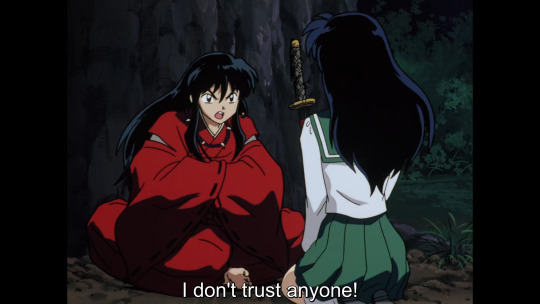
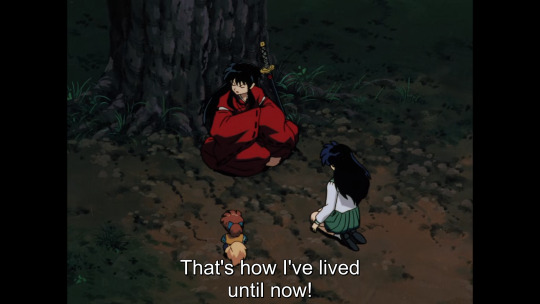
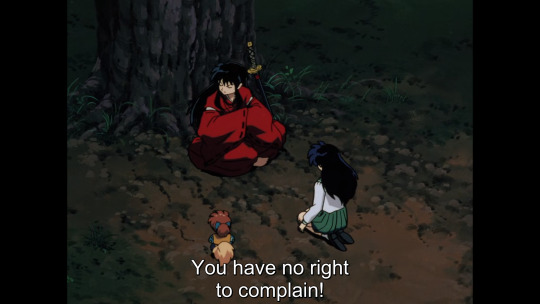
honestly, it would be shocking if someone who spent their entire life isolated from others and hated by everyone and under constant threat of attack because of that to trust anyone.
unnecessary overanalysis behind the cut
as far as we can tell, inuyasha only had positive interactions with two people ever before he met kagome--his mother, who represents his human side and died, and kikyo, who wanted him to become human and (from his perspective at this time) betrayed him before she died too. the only other person he seemed to have significant interactions with was his brother, who hated him for being a half-demon and literally tries to kill him several times. he gets constant reminders of his position by humans and demons, so it’s not like it’s a thing of the past.
how would someone under those circumstances be anything but defensive, distrustful, and emotionally dysregulated? he didn’t even get those childhood experiences like “sharing your toys” because he only had his mom and then she was gone too (and we saw what happened when he tried to play with humans). he didn’t learn those basic lessons that are crucial for emotional development, and it shows. i don’t necessarily think it was the writers’ intent to realistically portray psychological consequences of extreme persecution/isolation though.
inuyasha is short-tempered, prone to jealousy, insecure in a way that hurts others, closed-off, self-absorbed, etc. those are flaws and he should work on them, but it’s just...unrealistic to expect him to figure out how to manage his emotions so quickly. (later on we even see him act insecure about his own emotional volatility which is rly sad.)
not saying that kagome has such expectations or is wrong to be upset in this moment. she’s extremely supportive of him but he’s exhausting to deal with and of course it hurts when someone you care about says outright that they don’t trust you--not to mention the fact that inuyasha trying to hide this caused more trouble. this is more like...validation of the logic of inuyasha’s statement. it’s literally all he knows.
25 notes
·
View notes
Text
Episode 124: Lion 4: Alternate Ending

“Please tell me my destiny.”
We’ve had Ronaldo as a toxic gatekeeping fan intent on harassing the creator. We’ve had Lars as a disappointed fan whom the creator is desperate to impress. We’ve even had Navy as a false fan who’s only interested in robbing the creator’s spaceship (arguably a rarer breed than the first two). So now it’s time for the obsessive clue-hunter, who parses through the creation so deeply that the original meaning gets lost in the shuffle. And this time, our fan stand-in is Steven.
Lion 4: Alternate Ending is an episode about Steven trying to ruin Lion 3: Straight to Video. All the magic from that first glimpse of Rose Quartz threatens to be extinguished through overanalysis, to the point where his discovery of a new tape is met with dread instead of excitement. For all the Steven Universe fans that get frustrated by Steven not being as invested in the lore as they’d like, well, this is what happens when Steven gets as invested in the lore as you’d like.
To be clear, I don’t think Steven succeeds in ruining Lion 3, especially because the conclusion of Lion 4 manages to enhance its predecessor. I also don’t think it’s a bad thing that he tries: it fits his post-Storm in the Room state to tear through whatever evidence he's got to figure out why he was born, and it’s properly painful to see him so desensitized to the wonder of Rose’s tape that he’s reduced it to a possible decoded message. What better way to express how Steven feels than tainting a pivotal moment with his mother?

I’m super into stories where a mystery to the characters isn’t a mystery to the viewer: the core example is Cowboy Bebop episode Speak Like a Child, where our 2070s crew is trying to solve the case of a strange antique object that a 1990s audience already knows is a videotape (although a fifth of the way through the twenty-first century, we’re already getting removed from an era where modern audiences would know what a Betamax is, even as a cultural relic). Because the writers don’t have to try to fool us, we can focus more on how the characters tackle a problem instead of trying to beat them to the punch with our own deduction skills. I wouldn’t call Lion 4 the most concrete example of this sort of story, as it’s not impossible that Rose was leaving encrypted messages behind, but to me at least the “twist” that Rose’s tape wasn’t part of some dubious master plan is obvious enough that I can just enjoy the ride.
“Enjoy” is perhaps the wrong word, because while this is an excellent episode, it’s not a fun one. There are comedic moments, because this is still Steven Universe, but watching a kid at the end of his rope struggling to understand his place in the world is bound to be harrowing stuff. Steven’s determination is compounded by his solitude: the Crystal Gems are pointedly absent, as the last time he asked them for answers his dad got abducted to a space zoo and it’s easy to confuse correlation with causation. So it’s just Steven and Lion for most of the episode, and it’s telling that Lion answers Steven’s final cry for help by bringing him to see his dad. Some things can only be fixed by talking, and for all his strengths, Lion isn’t a great conversationalist.
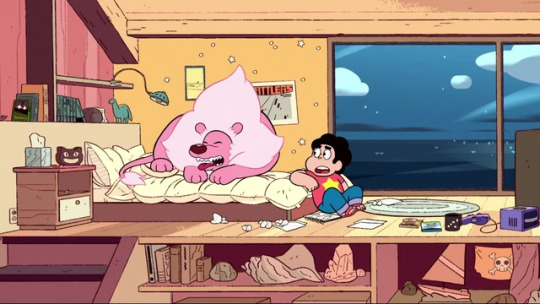
Before we get to Greg, this Steven/Lion solo outing uses constant activity to sidestep the dullness factor that bogged down Steven’s Lion. After a strong first impression of Steven’s mental state as he scours Rose’s tape for clues, going so far as to try to find meanings in anagrams, Lion revs up the plot by retching up a giant key. I love that Steven’s first thought is the same as mine, and likely yours: the chest in Lion’s mane that we first saw in Lion 3, which unlike Bismuth remained a mystery (and it still is, because we never saw what Steven found in there between Change Your Mind and the movie). Even though the key is comically oversized, Steven ignores the obvious and keeps trying to make it fit. So right off the bat, we get two little stories about Steven looking for answers where there clearly aren’t any and doubling down despite the futility out of sheer desperation for the truth.
From here we get a montage of past locations a la Marble Madness and Warp Tour, accompanied by a gorgeous medley of location themes from Aivi and Surasshu; I will never not complain that we don’t get to have an album of their scoring, because this episode’s soundtrack is one of their best. Visiting the Armory harks back to Lion 2 as the tape did for Lion 3, and we also get a glimpse of Rose’s Fountain and Rose’s Room to continue our references to the many known areas tied to Steven’s mom. When nothing works, Steven pleads with Lion for more information, aware by now that the cat has some answers.
While I’m not huge on Steven’s Lion as an episode due to the aforementioned dull pace, it’s awesome to see our heroes return to where Lion was first found. Buddy’s Book already did a great job of reminding us of Lion’s desert home, but now it’s time to finally investigate the area further.

Jesse Zuke and Raven Molisee paired up for our last episode, leaving their usual respective partners Hilary Florido and Paul Villeco at bat for Lion 4. The ragtag team has so far given us rich visuals, with a particularly expressive Steven and Lion (crucial for the non-talking member of the duo) and a callback to the lovely settings of the past, but every aesthetic choice they make is topped by the desert run. It’s a beautiful shot, evoking the iconic ocean run of Lion 2, but Steven’s exhaustion (aided by Zach Callison’s beleaguered performance as he narrates his thoughts) tinges the scene with melancholy where there was once only magic. Steven’s desperation is no longer the frenzied need from when Greg was kidnapped, or even from the beginning of this very episode, but has been worn down to a weary determination that just breaks your heart. This is Charlie Brown after a yanked football too many; he hasn’t been thrown a single bone in his search for answers, and this might be his last chance.
I try not to include too many images in these reviews, because they can mess with the flow of the text, but screw it this shot is also amazing:

The pyramid-like structures leading to the locked door are the first we see of a new hidden getaway, and retrospect makes Steven’s plight even worse: as we learn in Legs From Here to Homeworld, all he had to do was touch one of them to get a major hint about Rose’s true identity.
It wouldn’t have solved everything, as Garnet would likely assume they were spoils of war, Amethyst wouldn’t recognize them, and Pearl would keep her mouth shut. And it would’ve ruined the pacing of the mystery for such a strange hint to be presented, so from a storytelling perspective it makes total sense to keep this in the backburner. And it’s not like it’s that weird that Steven doesn’t feel compelled to touch what seems to be a couple of statues when he’s spent the whole episode looking for a lock and it’s right in front of him and he just survived hours of desert travel. But knowing what we know now adds to the drama of how close our hero is to the truth he deserves.
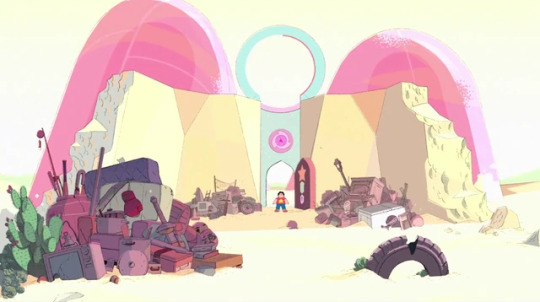
In yet another bummer, Rose’s hidden landfill is worn down to the point where most of the walls had collapsed, meaning Steven didn’t even need the key. Which isn’t to say the key wasn’t important, as it prompts his trip in the first place, but it’s just one more way that the universe seems to be throwing unnecessary hurdles at him. In the same vein, Lion not only could’ve warped him to the destination as he mentions, but he could’ve done so without hacking up the key in the first place. But we’re long past the point where we should expect straight answers from Lion, so I forgive the big lug.
The first thing that came to my mind when Steven saw the dump wasn’t Amethyst’s room, although there are obvious similarities. It was Greg’s storage locker, the place where we first talked about Rose all the way back in Laser Light Cannon, the place where Greg expressed confusion about why a magic woman fell for a regular guy like him. And as frustrated as Steven is, this room is a wonderful unspoken answer to that distant question: among Rose’s many imperfections was that, like Greg, she was kind of a slob. It’s so nice to have a mundane flaw after nearly a full season of focusing on her as a liar and murderer, especially a flaw that reminds us of why she and Greg were so great for each other.
But yeah, Steven isn’t interested in subtext, and his tantrum is both realistic and reasonable. He finds the tape for Nora by accident, right after kicking some garbage in anger, and this is where that Speak Like a Child oomph comes in. It’s crystal clear that the tape was a backup in case Steven was a girl, but he’s so primed for lies and complications that the obvious answer eludes him and he suspects the worst. I honestly can’t blame him. If you learned out of nowhere that your mom killed someone, who’s to say you don’t have secret siblings?
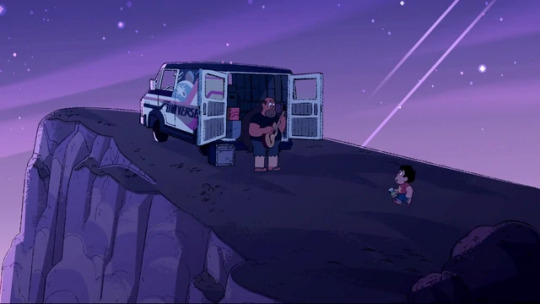
The contrast between harsh desert and soothing sunset is another treat for the eyes, readying is for a cooldown after two distressing acts. Greg’s excitement over seeing the old tape blinds him to Steven’s angst in a way that adds honest tension to the exchange, because he’s trying to give Steven a fun treat but has no idea how much anguish his son has been through to get to this point. To Greg, telling Steven the answers outright would be ruining the moment, but the wait is already killing the kid. In an episode without an external villain it’s such a clever way to present a final “confrontation” to overcome.
When we finally see the tape, it becomes even more apparent that it was a backup for a hypothetical daughter. Still, I love how the strange new version of a video we know and love is only half-seen, as we focus so much on Steven’s reaction at the expense of footage. Where he was once gazing at the marvels of a new glimpse of his mother, his eyes are now furrowed in frustrated concentration. As in Lion 3, he has a viewing partner, and Greg’s welling tears mirror those of Steven and Sadie from the first tape, highlighting that the Steven of the present isn’t feeling an ounce of tenderness.
Tears do come for Steven, but in the form of anxious release. When he’s told that he’s Nora, meaning he’s the person the tape was intended for, Steven still doesn’t get it and exclaims that he’s his mom and his sister; it’s sort of a joke, but boy is it rough to hear him slip that in some way he does see himself as his mom rather than his own person. So thank goodness he’s saying this stuff to Greg, who’s calm at first but leaps to the occasion when Steven frantically asks why he exists.
As is standard by now, Greg's got fatherhood down cold. He adjusts his tone to show he’s taking Steven seriously, but rather than jump in he sits his son down and lets him talk. He addresses Steven’s concerns gently but firmly, leaving no room for doubt that he’s loved and appreciated no matter what. He brings himself into the conversation by saying he changed his name, doing so not to turn the topic to himself but to reassure Steven that it’s okay to not be stuck on one identity. And just look at how perfectly our three main characters exist in the shot during this last talk:
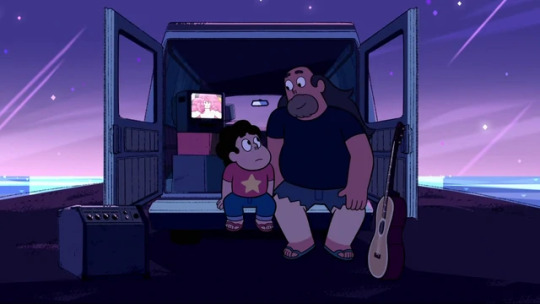
Steven gets those happy post-tape tears after viewing the last part of the video, and our happy ending is earned, but it’s not a full victory. Rose still had issues, but at least Steven has gained some confidence back that she wasn’t all bad. He’ll go back and forth on how much guilt he feels for her actions, but at the very least he knows now that his decisions to try and atone for her mistakes are his to make, and not a mandate from a dead parent looking for an escape route.
Whiiiiiiich means that now he’s able to try and feign a sense of control over helpless situations by assigning blame to himself in new, exciting ways. Hey, it’s not like the show could’ve solved all his problems less than halfway through Act III of the series. Lion 4 thus doesn’t have the conclusive oomph of Lion 3, which closed a trilogy of Lion Episodes as well as the stage of the show where Rose was a well-realized but distant idea more than a full character. For all its strengths, Lion 4 feels much more like Just Another Episode. But that’s okay. It doesn’t owe the past a thing.
Future Vision!
Again, those pyramids return in a major way, because they’re not pyramids.
Greg talks about Garnet’s inability to predict things about Steven, which is an element of their relationship throughout the show but gets major focus soon in Pool Hopping.
Escapism blends the two big Lion Runs by setting it back on the ocean, but making the passenger an exhausted Steven facing one last ordeal before relief in the form of his dad with a guitar.
We’re the one, we’re the ONE! TWO! THREE! FOUR!
It doesn’t make the top twenty, it does make the top twenty-five. Just like Bismuth right before our hundredth episode, this doesn’t mean much now, but it will next time, because I’m expanding again to a Top Twenty-Five when we hit the big One Two Five with Doug Out.
Top Twenty
Steven and the Stevens
Hit the Diamond
Mirror Gem
Lion 3: Straight to Video
Alone Together
Last One Out of Beach City
The Return
Jailbreak
The Answer
Mindful Education
Sworn to the Sword
Rose’s Scabbard
Earthlings
Mr. Greg
Coach Steven
Giant Woman
Beach City Drift
Winter Forecast
Bismuth
Steven’s Dream
Love ‘em
Laser Light Cannon
Bubble Buddies
Tiger Millionaire
Lion 2: The Movie
Rose’s Room
An Indirect Kiss
Ocean Gem
Space Race
Garnet’s Universe
Warp Tour
The Test
Future Vision
On the Run
Maximum Capacity
Marble Madness
Political Power
Full Disclosure
Joy Ride
Keeping It Together
We Need to Talk
Chille Tid
Cry for Help
Keystone Motel
Catch and Release
When It Rains
Back to the Barn
Steven’s Birthday
It Could’ve Been Great
Message Received
Log Date 7 15 2
Same Old World
The New Lars
Monster Reunion
Alone at Sea
Crack the Whip
Beta
Back to the Moon
Kindergarten Kid
Buddy’s Book
Gem Harvest
Three Gems and a Baby
That Will Be All
The New Crystal Gems
Storm in the Room
Room for Ruby
Lion 4: Alternate Ending
Like ‘em
Gem Glow
Frybo
Arcade Mania
So Many Birthdays
Lars and the Cool Kids
Onion Trade
Steven the Sword Fighter
Beach Party
Monster Buddies
Keep Beach City Weird
Watermelon Steven
The Message
Open Book
Story for Steven
Shirt Club
Love Letters
Reformed
Rising Tides, Crashing Tides
Onion Friend
Historical Friction
Friend Ship
Nightmare Hospital
Too Far
Barn Mates
Steven Floats
Drop Beat Dad
Too Short to Ride
Restaurant Wars
Kiki’s Pizza Delivery Service
Greg the Babysitter
Gem Hunt
Steven vs. Amethyst
Bubbled
Adventures in Light Distortion
Gem Heist
The Zoo
Rocknaldo
Enh
Cheeseburger Backpack
Together Breakfast
Cat Fingers
Serious Steven
Steven’s Lion
Joking Victim
Secret Team
Say Uncle
Super Watermelon Island
Gem Drill
Know Your Fusion
Future Boy Zoltron
Tiger Philanthropist
No Thanks!
6. Horror Club
5. Fusion Cuisine
4. House Guest
3. Onion Gang
2. Sadie’s Song
1. Island Adventure
(Kind of unbelievable to me that a Lion Sequel doesn’t have official promo art, but luckily we have discount-supervillain’s measured take on what Nora Universe would realistically look like.)
66 notes
·
View notes
Note
I would reserve judgment but I don't think Emmerdale deserves being given the benefit of the doubt, HAHA! One thing is for sure, Canteen Casanova and the timing of his introduction is very plotty. The possibility of a romance between him and Vic scares me the most. By the way, nice seeing you here again:) I've always loved reading your thoughts on the storyline xx
Ooh I’ll always give the benefit of the doubt first haha. But exactly, he’s there for a reason. And while I do think we’re probably going to have to watch a romance between the two of them, I think that will just be to keep him around long enough to serve his greater purpose… Whatever that may be!
And thank you, that’s very kind! :) I’ve kind of missed the unnecessary overanalysis of all things ED haha.
#the fictional village now Robertless#I'm not a fan of any of it to be frank (who I miss and am still awaiting justice for!) but I feel there is a purpose#living in hope as ever
6 notes
·
View notes
Text
In Defense of Audrey
I don't know how much of a hot take this is, but Audrey from Little Shop of Horrors is so insanely overlooked. So here's an analysis of her that no one asked for because I can.
This will go by each song in the stage musical soundtrack (specifically the 2003 revival because Kerry Butler slaps). I'll try not to put too many things from the movie and just stick to the musical the movie is based on, since the movie cut a few things (and the endings of the movie and stage show are extremely different).
Quick content warning: This analysis will include mentions of abuse (physical, verbal, and emotional) since it appears in the musical. I encourage you to skip this if that is something that is triggering for you.
I will try to keep each section of the analysis as brief as I can, but just in case, I will highlight any key parts. Sorry if this is all incoherent or weird, I’ve never really written many character analysis. I also put a ”keep reading” thing because this bad boi is LONG and i didn’t want people to have to scroll forever and hate me (/lh)
There will also be spoilers for the musical, so if you haven't seen/listened to it and plan on doing so (which I highly recommend) you may want to skip this. Unless you don’t care for spoilers (i still recommend you watch or listen to the show or the movie.
Skid Row (Downtown)
Audrey's introduction to the musical, although small, gives a small window into mostly what Skid Row is like, but also a little about her life. She sings:
Where the guys are drips
Where they rip your slips
Where relationships are no go
Down on skid row
Audrey calls the guys in Skid Row "drips", which could mean that she finds them boring and not all that interesting. The next line references her abusive relationship with Orin, her dentist boyfriend, and how Orin acts forceful toward Audrey. Based on the next two verses, it's very possible that Audrey knows that being in a relationship isn't the greatest idea, either because she's poor or because she knows how terrible Orin is.
The ending of the song (when Audrey and Seymour are singing in unison) shows that Audrey doesn't want the life she has and wants to leave it. This idea links into the next song she's in, her big "I Want" song, in which she perpetuates that idea that she wants a different life.
Ya Never Know
Audrey doesn't show up in this song, but she is talked about briefly by Mr. Mushnik and Seymour.
After Seymour's first (?) interview about Audrey II (the plant Seymour takes care of), Seymour asks Mr. Mushnik where Audrey is, and says, "she was s'posed to be here." Mr. Mushnik simply says "Forget about Audrey!"
Clearly, Audrey means a lot to Seymour. But she isn't too much of an importance to Mr. Mushnik because Audrey hasn't given Mushnik any success to the florist shop, unlike Seymour.
Somewhere That's Green
I used to absolutely despise this song because I always thought "All it's about is her wanting a husband. And it's heteronormative."
But the song isn't just about Audrey wanting a husband. It's about the life she wants based off the media she sees. Most of those things being around the time period the show takes place (around the 1960s).
Audrey bases her dream life off of idealized versions of life. She references several mid-1900s sitcoms, that are (by nature of the genre) idealizations of the white, suburban life. She also expresses wanting to be like Betty Crocker and Donna Reed, who are part of the housewife stereotype: being able to cook any meal (Betty Crocker) and beautiful (Donna Reed. but can you blame Audrey? Donna Reed was beautiful and awesome). She even references two magazines (Better Homes and Gardens) that were idealizations of the suburban home as a whole.
Audrey wants a life made from idealized media because they're simple. Unlike her daydreams, Audrey’s life is far from simple. Audrey lives in the economically poor Skid Row with an extremely abusive boyfriend, referenced in the beginning of the song.
But I'm dating a semi-sadist
So I got a black eye and my arm's in a cast.
It's safe to assume Audrey probably knows that Orin is not good for her health, but is understandably afraid to break things off because he could do something to her. As she stays with Orin, she justifies staying with him. Right before "Somewhere That's Green", Audrey explains to Ronette, Chiffon, and Crystal why she stays with Orin. She says something along the lines of "if this is how he treats me when he likes me (referring to her broken arm and black eye), imagine how he'll treat me when he doesn't like me!". Having her little daydream might give her some freedom from Orin, even if it is for a short while.
Audrey's daydream acts as a way to escape from her current situation and imagine a happier life for herself.
When she talks about a "he" in the song, Audrey isn't necessarily talking about Seymour, even though she does talk about him at the beginning
Just me and the toaster and a sweet little guy--like Seymour!
It certainly sounds like she is thinking about Seymour since she talks about him in the beginning, and the lyrics "He rakes and trims the grass/ He loves to mow and weed" definitely seem like Seymour (considering Seymour knows everything about plants). But going back to the whole theme of idealization in the song, having a husband and being married would definitely be a staple of the middle class, suburban household, and something Audrey would want to complete for the ideal life.
That isn't to say Audrey doesn't care about Seymour, because she does! It’s just that at this point of the show, Audrey just wants the life she sees depicted around her, and part of that idealized life is having a husband.
(I hope I don't have to explain this, but just in case: obviously the idea that people have to be married and the heteronormative view of marriage is outdated. No one needs to have either of these to live a fulfilling life or have a meaningful relationship.)
Closed for Renovation
This song is more for exposition, but there's a few things to say about Audrey. Audrey expresses concern for Seymour because he's been getting hurt for reasons unknown to anyone except Seymour and the audience. So Audrey obviously cares about Seymour's well-being and him in general.
Audrey: You've been getting hurt so much lately!
There's also a use of flower symbolism within Seymour and Audrey's dialogue in the song. The flowers used for Audrey are fitting for her personality. Audrey talks about daisies and fleur-de-lis ("flower of the lily" in French) which both represent purity and innocence, and Audrey maintains her pureness throughout the show. She also mentions the forget-me-not flowers, which represent true and undying love, which could be Audrey hinting at Seymour that she actually loves him.
Feed Me (Git It)
This song introduces Orin and Audrey's dynamic and relationship. Orin repeatedly verbally and emotionally abuses Audrey. He tells her she's stupid for forgetting a sweater at the florist shop, and the whole situation seems to be overwhelming for Audrey.
She tries to act as if she's got it all under control, when in reality, Audrey doesn’t have any control over the situation and is under pressure from Orin’s irrational anger. At least in how it sounds in the soundtrack, Audrey sounds panicked and stressed as she says the lines:
Audrey: Hi, Seymour. I left my sweater here before...
We also see her stand up for herself when Orin hits her, to which Orin shows no remorse. Clearly, Orin doesn't care for Audrey at all, both for her well-being and what she wants, which is in direct juxtaposition to Audrey's care for other people.
It makes sense why, in Somewhere That's Green, Audrey would talk about wanting a life that's more simple (especially around a family life): she doesn't have a happy relationship with Orin at all.
Something else I noticed (I don't know if this is intentional or not) was that in Somewhere That's Green, Audrey says "he's father he knows best", saying that her Daydream Husband would be the head of the house. It would make sense, historically speaking, why she would say that. But Audrey could also be saying that because she believes that she is supposed to be the submissive housewife. Audrey is expected to be submissive toward Orin in their relationship, with him insisting on her calling him "doctor" (yikes), so she might have just assumed that's how all relationships are.
(((PS: has anyone noticed both the beginning of Feed Me (Git It) and Somewhere That's Green are the exact same music-wise?)))
Call Back in the Morning
This song is similar to Closed for Renovation in that not a lot is shown about the characters. It brings up some more flower symbolism, though. Audrey asks if someone would like carnations or yellow roses, which are both about romantic feelings. Carnations represent affection and love, feelings Audrey has towards Seymour. Yellow roses represent loss of love, which could be feelings Audrey either feels or thinks she needs to feel about Orin's recent death (occurs in ‘Now (It's Just the Gas)’).
Suddenly, Seymour
Okay, this might sound really bad, but hear me out: the beginning isn't actually horrible. In fact, Seymour singing
Lift up your head, wash off your mascara
Here, take my Kleenex, wipe that lipstick away
Show me your face clean as the mornin'
I know things were bad but now they're okay
It actually serves a purpose.
The makeup in the song is more symbolic of Audrey hiding what she went through with Orin—as she has previously throughout the show. By telling her to take off her makeup, Audrey can finally admit (instead of hiding like she has before) that she went through abuse and confront that it existed, so she can begin to heal from it. It's not "Oh YoU dOn'T nEeD mAkEuP tO lOoK bEaUtIfUl To Me", but rather a "Hey, you went through a really messed up and harmful experience. We're going to face it together and begin healing." This post and this post both explain my thoughts on these lyrics excellently.
This song also gives us a closer look into Audrey's life before the events of the musical. Audrey's history with men was never good to begin with as her father abandoned her mother and Audrey. Then, Audrey fell into relationships where she became more submissive.
I'd meet a man and I'd follow him blindly
He'd snap his fingers, me, I'd say, 'Sure'
At this point in the show (and song), Audrey is able to explain how much Seymour has affected her life. Seymour’s nothing like the other boys she's had in her life, and it's implied that she actually wants to be with him. This isn’t the first time Audrey has expressed wanting to be with Seymour either, because it's been stated before in the show.
“Still, that Seymour's a cutie
Well, if not, he's got inner beauty
And I dream of a place
Where we could be together at last”
(Somewhere That’s Green)
Even knowing that Seymour isn't like the other boys she's met, Audrey is nervous about being with him because it's "still strange and frightening". In comparison to all the other relationships she's been in, being with Seymour would be different and strange.
Sominex/ Suppertime II
In her core, Audrey is a compassionate person and cares for other people. She is worried for Seymour and goes to check on him, only to be met by Audrey II.
While she is innocent and a bit naive, Audrey most certainly isn't ignorant. As Audrey II tries to get Audrey to "help" him, Audrey is initially cautious ("I don't know if I should!"). She wants to help the plant, but isn't sure it's a good idea, especially since she just found out Audrey II can talk. And I don't know about you, but if I witnessed a plant talking to me, I'd definitely be cautious about helping it.
Audrey isn't ignorant. She knows that there's something weird about Audrey II. It’s Audrey's innocence and drive to help people that leads her to override her initial concern about the plant. Audrey II also aides in this by taking advantage of Audrey's compassion and naivety. Both of these end in Audrey being hurt by the plant.
Somewhere That's Green (Reprise)
In "The Meek Shall Inherit", Seymour is afraid of Audrey not liking him anymore if he becomes poor. Which turns out to be very untrue because in this song, Audrey shows she cares about Seymour and doesn't care that Seymour murdered Mushnik and Orin to get famous (to each their own, I guess???).
In this song, Audrey is able to have her own autonomy within a relationship. Audrey tells Seymour to feed her to Audrey II as her "one gift" to Seymour, so he can become more famous and get all the things she believes Seymour deserves. Seymour respects Audrey's wish, and gives her to the plant.
This scene is important because it's the second time that Audrey expresses that she is in pain as a result of something happening to her— the first time being when Orin hit her. The way that both people involved react to her pain is different and shows their character.
Audrey: Orin, that hurt!
Orin: Move it!
(Feed Me (Git It))
In "Feed Me (Git It)", Audrey is the one to say she is hurt, only to have Orin not acknowledge that she has been hurt by him or that he cares. At least how Kerry Butler portrays Audrey in the scene, Audrey seems nervous to tell Orin he hurt her. Based on that, I'd assume this sort of behavior from Orin wasn't a one-time event, and it would explain why Audrey would be a bit more nervous to tell Orin.
Seymour: Audrey, are you alright?
Audrey: Yes! No...
(Somewhere That's Green (Reprise))
What makes this scene different from the one in "Feed Me (Git It)" is that Seymour is the one to ask if Audrey is alright. He is showing that 1) he cares for Audrey's well-being and 2) she is safe to tell him how she feels. Audrey understands that sentiment and tells Seymour how she honestly feels.
Ending Note
Hopefully, I was able to maybe get you to like Audrey more or at least notice maybe one new thing??? I've been putting off posting this because I want it to be as clear as possible what I'm trying to say, but I can't wait around forever. If you've noticed anything that I didn't mention, I'd love to hear it! If I said anything extremely wrong, please don't hesitate to tell me. I don't mean to hurt anyone. I might do some more characters, so if you have any you’d like me to analyze too much, I’d love to hear it! Or I might just do more that no one asks for cuz I had a lot of fun doing this!
#fight me#audrey is so much more than people think#little shop of horrors#audrey little shop of horrors#overanalyzing characters with bugs#an unnecessary overanalysis#IN DEFENSE OF AUDREY#lsoh#audrey lsoh
26 notes
·
View notes
Text
Official Kingdom Hearts 3 Twitter Countdown Analysis - XIII Days to Go
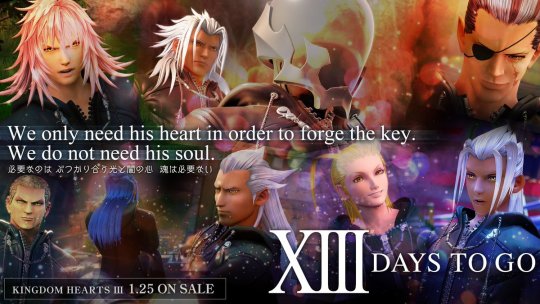
Thanks to @angel-with-a-pipette and her friend for the tip and screenshot!
The Japanese text says:
必要なのは ぶつかり合う光と闇の心 魂は必要ない
Literal translation time:
“What is necessary is (a) heart of clashing light and darkness. (The) soul is unnecessary.”
Slightly smoother translation time:
“We need his heart with light and darkness clashing (within it). His soul is unnecessary.”
This has me really intrigued because as @angel-with-a-pipette pointed out, souls have been discussed in Kingdom Hearts before, in a number of the Secret Ansem Reports to be precise. From Secret Ansem’s Report 4, emphasis mine:
Three elements combine to create a life: a heart, a soul, and a body. But what of the soul and body left behind when the heart is lost? When the soul leaves the body, its vessel, life gives way to death, but what about when the heart leaves? A being does not perish when its heart leaves its body. The heart alone disappears into the darkness.
The Japanese version, emphasis mine:
生命を構成する3要素……心、魂、肉体。生命が心を失った時、残された魂と肉体は? 器である肉体に宿った魂が離れる時、生命は死を迎える。しかし心が離れる時はどこへ? 心が肉体を離れても、生命は滅びない。
ただ心のみが闇へと消え去るだけだ。
Tamashii is indeed used here to refer to the soul, same as the word in the dialogue snippet above.
So basically this is saying that in the KH universe, you will die if you lose your soul. But apparently whoever is speaking here only needs this person’s heart and doesn’t care about their soul. That is... uh... a little concerning, to say the least. If a person needs their soul to live, and Xehanort doesn’t need that soul for his plans, whoever is being spoken about here is in serious danger.
I also checked what the Lingering Will is called in Japanese, and the word for will, shinen, is different from the word for soul, tamashii. So this isn’t talking about Terra or the Lingering Will per se, though I won’t rule him out completely.
Also interesting to note that the Japanese version mentions the necessity of light and darkness clashing within this person’s heart. Hmmm... Sounds like it could be Ven, but... I’m leaning towards Sora, based on what Vanitas told him in an earlier trailer.
In previous promotional material, the villains have been focused on getting Sora to fight and fight and fight and this sounds similar to that kind of rhetoric, especially the English dialogue mentioning they need whoever “he” is to forge the key - sounds very similar to what Vanitas says (presumably to Sora) in the TGS 2018 Short Trailer.
We know that Thirteen Darknesses and Seven Lights are needed to form the χ-Blade, but whoever “he” is apparently also needs to have light and darkness at war within him for the χ-Blade to be successfully forged, combining both the English and Japanese dialogue here.
Yeah, I’m gonna guess that it’s Sora.
If this analysis is correct, then for whatever reason it’s Sora’s heart they need with light and darkness clashing within it. Interesting they don’t need his soul, though - is his soul going to play a role here? Are they intentionally stirring up the darkness within him so it will be at war with the light? Probably. Maybe they will try to break his soul/spirit (tamashii could be translated either way) - which could very well kill him! - in order to get to his heart?
I can picture this being a dialogue where one person expresses concern over Sora’s soul/spirit getting destroyed because it might jeopardize their plans and the other person is like “no it’s fine, we don’t need it anyway.” The English translation of the dialogue and its lack of contractions makes me think either Xemnas, Ansem, or perhaps Xehanort is speaking here to give weight to this theory, as they all tend to speak rather formally.
Still, I won’t completely rule out it might be Ven or someone else, as before Xehanort did try to forge the χ-Blade from a similar clash of light and darkness within Ven’s heart.
Anyway, that’s all I’ve got! Feel free to take it away from here :)
Edit to add (which is also in the reblog):
This is the thirteenth day before KH3 releases in Japan, as shown by the heading in the picture.
XIII.
XIII.
With a picture of a bunch of other Norts and a quote that might refer to Sora, who, as we all know, almost became the Thirteenth Seeker of Darkness in DDD.
And he was referred to as Number XIII when he was a contestant on the Grid in DDD.
Am I reaching? Potentially, but this is the kind of overanalysis I live for, so here we are :D If this quote isn’t about Sora then it might be about whoever the thirteenth intended Seeker is. It could also just be a complete coincidence or a misdirection to keep people wondering. It’ll be interesting to see if the Twitter account releases more images like this, and if so, who they’ll be about.
But hey, what is fandom for if not speculation? Have at it, everyone!
#kh3 spoilers#kh3#kingdom hearts 3#kingdom hearts 3 spoilers#kingdom hearts#kh analysis#kh translation#phoenix translates#long post#kh japanese#sora#this game is not going easy on you is it#:'(#soranort#maybe#who knows
80 notes
·
View notes
Text
Overanalysis of Mihotose no Komoriuta (spoilers ahead)
As a huge fan of this musical, I couldn’t help but gather my thoughts on this masterpiece. Beware of spoilers and of many unnecessary analysis ! Long post with screencaps !
Credits to screencaps and subs : Amaris fansub and @sohmariku
-- A subtle theme of Ruriiro no Sora begins when Ishikirimaru mentions their story for the first time.
-- Monoyoshi happily singing Ruriiro no Sora before the mission even started, showing how attached he is to the Tokugawas. The theme of Ruriiro no sora will become sadder and sadder along the musical.
-- Nikkari is the first to hold 1-month-old baby Takechiyo, which is nice, when we know he will become the closest to him with Monoyoshi.
-- The Master and Ishikirimaru know the vassals have been killed, and the only way to get it right is to become the vassals. When they leave, Ishikirimaru is the only one knowing it’s gonna be a long mission.
-- Nikkari to Ookurikara : “Looks like we’re fated to stay together” might be foreshadowing
-- Baby Takechiyo is laughing every time he is in Monoyoshi’s arms
-- Ruriiro no Sora sang my Monoyoshi is way more cheerful than any other versions. At this moment he is just happy to be reunited with a Tokugawa. Ishikirimaru may be thinking of assuming Hanzo’s role at this moment. He is observing everyone and then the baby.

-- 10-year-old Takechiyo outfit could be matching Nikkari and Monoyoshi’s color scheme (all right, this one is certainly an overoveranalysis)
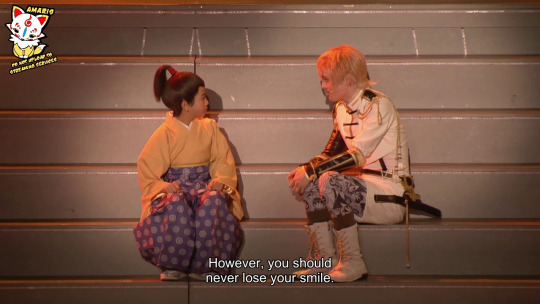
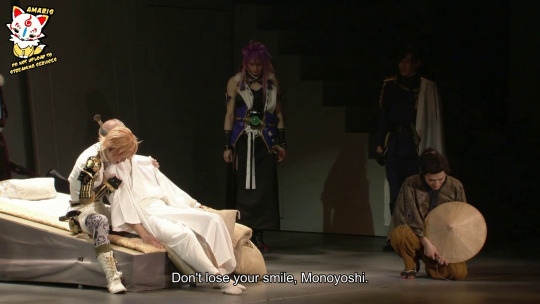
-- Nikkari learns two lessons from Monoyoshi : “You should never lose your smile”

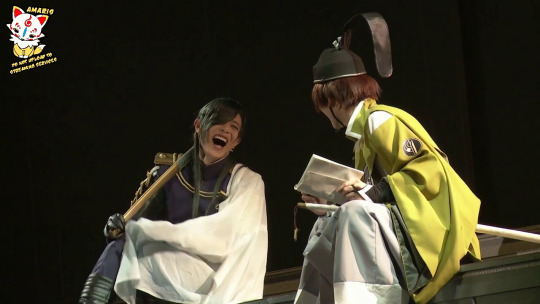
-- And the “Laugh Strategy”. Nikkari starts to laugh, to make Ishikirimaru laugh back, and bring him good fortune again. (also, he learns that smiles aren’t always “Nikkori”)
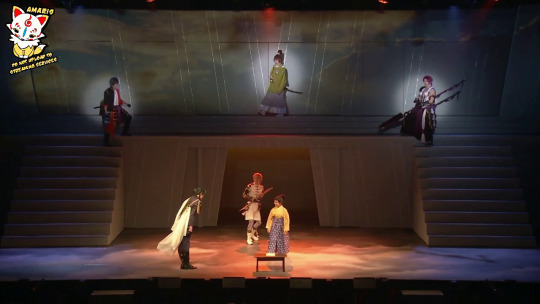
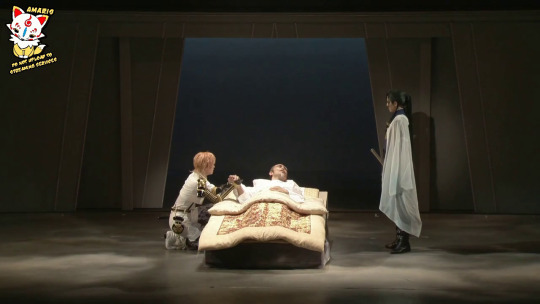
-- Nikkari & Monoyoshi : They are Takechiyo’s preceptors. Monoyoshi teaches him how to fight, while Nikkari supervises school. We see him teaching maybe reading, and mathematics. They are the first to come&see Ieyasu on his death bed.
-- Ishikirimaru is more interested in Baby Nobuyasu than tactics useful to fulfill their mission as Touken Danshi
-- Most likely, Gohei was supposed to die by the hands of the swordsmen, or at the Fort Marune but he didn’t, thanks to Ookurikara. Ironically, the one TouDan who has no interest in changing history at all, is the one to create the most important one. Indeed Nobuyasu is supposed to die from his father’s orders, but Gohei’s presence and friendship change the balance between father and son. But fate will catch them, as it is Gohei’s death that changes Nobuyasu’s state of mind and eventually drives him to suicidal thoughts.
-- The whole scene where Ishikirimaru realizes he’s been killing not even Retrogrades, but human beings, breaks my heart. We can see Nikkari above him, who stops fighting and is watching him, concerned.
-- And just after, Ishikirimaru snaps at Ookurikara’s comment. I think he’s angry towards himself more than anyone else.
-- The theme of Kibou no Minamoto plays when Ookurikara pledges allegiance. One more step following the right flow of History.

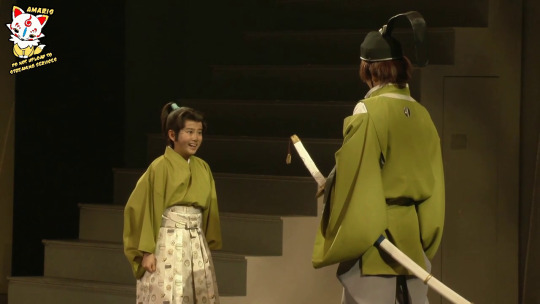
-- Ishi/Hanzo and Nobuyasu’s relationship is utterly important. Even Nobuyasu’s outfit matches the colors of Ishikirimaru. Their movements will also match during scenes, even in the background. Ishikirimaru follows his duty and tells him to learn sword fights, as the firstborn of a family of warriors. But he also teaches him the core of his own personality, to love and cherish living beings.
-- Nikkari tries to talk to Ishikirimaru, to make him face his feelings. But Ishikirimaru runs away. The next time we see a similar scene, 10 years has passed. We can assume Nikkari tries several times. Or maybe he didn’t, out of respect for Ishikirimaru’s feelings. Nikkari is not the type of personality to force people to act.
-- Monoyoshi was going to tell Ieyasu : “A smile will bring Good Luck” but Nobuyasu does it first. Monoyoshi is a proud parent.
-- Ieyasu acknowledges Hanzo/Ishi heavy involvement in Nobuyasu’s education, but Nikkari worries too much now. He is the only one to foresee Ishikirimaru’s heavy duty as Hanzo.
-- Even if Sengo seems careless, he actually cares a lot, and is very professional. He knows he is a Muramasa, a sword family cursed for the Tokugawa family (A muramasa killed Ieyasu’s grand-father, father, and Nobuyasu too). He stays away to be sure nothing happens to any Tokugawa before time. Then he becomes a vassal, around the time Nobuyasu should commit suicide. He also protects Monoyoshi, so he would remain a “lucky” sword.
--The theme of Touken Ranbu is playing, when Nikkari and Ookurikara discuss Ishi’s conflict with war. A reminder they’re Touken Danshi with a duty to fulfill, with their own share of conflict.
-- Historically, the Six vassals died before Tokugawa. Which means, the Mihotose Team fulfilled their duty until the historical death of their role, disappearing one by one, then certainly watching the others from afar. Naomasa (Sengo) and Tadakatsu (Tombo) are the last to die in 1610. The TouDan may have returned to the citadel but I think they stayed to ensure Retrogrades wouldn’t come back to interfere in Ieyasu’s end of life. They come back to witness Ieyasu’s death and say their goodbyes. The two first to show up are Monoyoshi and Nikkari, the closest to him when he was a child. Ieyasu thinks he’s seeing spirits. Then Nobuyasu’s real spirit shows up. He took the name of Gohei, meaning his spirit is free from torment.
They stayed alongside Tokugawa Ieyasu for 73 years.
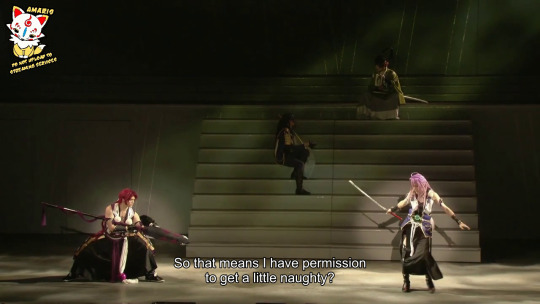
Bonus :
- For IshiKari fans like myself: In this scene, Ishi shows him Nikkari’s portrait, without real enthusiasm from Nikkari. Then he shows him Ookurikara’s. During Tombo and Sengo’s scene, we see IshiKari chatting, Ishi shows Nikkari’s portrait again. I think he’s asking him what’s wrong with it! Then, after Muramasa’s and Monoyoshi’s scene, we see Ishi with the pen in his hand, drawing on Nikkari’s portrait again! He wants Nikkari to be proud of his drawing aren’t they cute ??
#touken ranbu#toumyu#ishikirimaru#nikkari aoe#ookurikara#sengo muramasa#tombokiri#monoyoshi sadamune#my edits
56 notes
·
View notes
Text
Shivaay: The Bigger Picture
On watching the last two episodes (Monday+Tuesday, 26/27th June), I can’t help but feel that... Maybe we’re not seeing the complete picture when it comes to Shivaay. I know the plot is being framed in the classic style of ‘Shivaay was broken by Anika, and now wants revenge by making her life difficult’... but I’m just getting this niggling gut feeling that there may be more to this track than we’re being shown.
Things that have me intrigued/lend credibility to my theory:
He knows where she’s living and has been watching her.
I mean, it’s a completely logical assumption that she would go to Chanda - she doesn’t have anyone else - but he actually goes out there and watches her. For all the fanfare and excitement that was created about how these two would “meet” after three months, there was no big hoopla about this being the first time he saw her after such a long time - which makes me think that this definitely isn’t the first time he’s seeing her after she left. It seems to have become a habit for him. How long has he been doing this for? How many nights has he been out there, just standing and staring at her window (whether she’s visible in it or not)?
What intrigued me most is that he’s shown thinking of their last few moments and all the awful things she said, but he doesn’t look as FURIOUS as he should? He watches her with the most peculiar expression, filled with hurt and longing. If this was the FIRST TIME he saw her after all this time, surely he wouldn’t have such a reserved and mellow reaction? This is the reaction of a man who’s taken his time to ruminate and work through his grief and anger and has arrived at acceptance, all the while staring at her from a distance. That’s not to say that he’s not angry with her; he is, for sure, but NOT because he believes that she turned into a greedy gold-digging homewrecker overnight (like she wanted him to), but because she didn’t trust him enough to share whatever compelled her to do this, and that she just threw their relationship away without a thought of what it would do to him.
His interest in the chawl, juxtaposed with Samar’s interest.
From what we know of Shivaay, he is destructive as fuck. It would be completely in his old nature to buy the chawl and raze it flat to the ground just because Anika resides there. So far the assumption we have for his interest in the chawl is exactly that - he wants to buy the chawl just to make Anika’s life difficult. But what really made me think was the dialogue in yesterday’s episode:
“Yeh chawl toh main khareed kar rahoonga. Yahan tum jo rehti ho.”
Angry-ish dialogue delivery aside, nothing really seems to indicate that he actually wants to destroy the chawl. What if Samar is the destructive one here (is his heartache and day drinking related to a love interest who used to live there?), and Shivaay’s relentless interest is in PRESERVING the chawl to protect Anika and Chanda?
Complete rebuffal of Pinky.
Of course, there have been past instances where he’s been rude and dismissive of her, but he’s hit by guilt almost immediately and seeks her out and apologizes in the next scene. Today’s scene where he flings the first aid chest away and does not offer an apology stands out as a distinct shift in their relationship. Shivaay just does not seem to care for his mother’s feelings anymore. In fact, he doesn’t seem to care for anyone but OmRu/Gauri anymore, not even Dadi.
Complete lack of interest in Ragini.
Understandable. He’s still in love with Anika, is too raw from how the relationship ended, and is definitely not ready for a new romantic relationship. But like I mentioned in the lb, he doesn’t even seem to really care for Ragini as a friend, like he used to for Tia. With Tia, he was actively invested in her well-being and happiness and feelings. But with Ragini, the “friendship” is completely one-sided, with Shivaay expressing the most perfunctory of social niceties, and his demeanor mostly being coolly distant and like he’s putting up with her because he has no choice. The only interest he seems to really have in her is that she is Samar’s sister.
Masochistic/mild suicidal tendencies.
I wouldn’t go so far as to say that he’s actively suicidal, but he definitely doesn’t care about his health anymore. The man who used to pop a zillion pills (necessary AND unnecessary) and used to be a germaphobe (“CHAPPAL KE HAATHON SE MERI DAWAAIYON KO CHUA TUMNE?!?!?!”) now refuses first aid. I doubt he’s been taking his heart medication regularly either. He rides his bike recklessly and likes to flirt with death by braking at the edge of a cliff at the very last second. And the most intriguing of all - Shivaay Singh Oberoi, who would rather die than be disrespected/touched by common riffraff, actually invites them to hit him and takes their repeated blows without retaliating.
The key thing is to remember the last time he did such a thing. It was after he threw Anika out of the house for the Dev Chaabra incident, and Anika saved him from the Gayatri murder accusation the very next morning - he took the punches of the goons who were harassing Anika, because he thought HE DESERVED PUNISHMENT for what he did to her. The question is - if he is the victim in this scenario, why does he think he deserves punishment? What is he blaming himself for? What does he know that makes him think he deserves this?
The man has definitely changed; we knew he would; but he has not reverted to the arrogant, name-dropping, rage-monster SSO from the start of the show like we’d assumed. Instead, we have a new hybrid SSO 3.0 - the impulsiveness and recklessness of SSO 1.0 (limited to destroying HIMSELF - not others. YET.) but combined with the emotional contemplation and feelings of Anika’s Shivaay (SSO 2.0) All this makes me think that Shivaay KNOWS (what, and how much, I have no idea...) But I feel like he knows SOMETHING, that has driven his character to change like this.
(Please note this usual disclaimer of this piece of writing being the overanalysis of a brain that puts faaaaaaar more thought into the show than the makers do. How much of this is true, how much of it is my overactive imagination, who the fuck knows anymore?? For all we know, all of this can be shot out of the water by tomorrow’s episode. But for now, it stands.)
47 notes
·
View notes
Text
So 1996 Benvolio…
I cant believe yall pressured me into this. But fine, I will do what the people want. (/j)
Okay so 1996 Romeo+Juliet really did a disservice to Benvolio’s character. I’m not talking about Dash Mihok’s acting, I’m talking about all the lines that were cut from the script. I will do my best to explain my thoughts.
For Benvolio’s first scene, the script did a pretty good job at keeping with the play. But after that, it’s all downhill.
After the scene when Romeo and Juliet do that whole “wherefore art thou Romeo?”, Mercutio calls out for Romeo (because he’s just ditched Mercutio and Benvolio). The script completely cut Benvolio’s lines in that scene. In the movie, it’s only Mercutio calling out for Romeo and then he leaves. While in the original play, Mercutio AND Benvolio call out for Romeo.
By cutting out Benvolio’s lines (and the majority of the lines) in this scene, we miss out on seeing the emotionally understanding side if Benvolio that we see when Mercutio makes sexually suggestive comments about Romeo and Rosaline. Benvolio knows that Rosaline is a touchy subject for Romeo, which is established in the first few scenes of the film and play. But that whole banter is cut in the film. By cutting most of the scene, there’s almost no need to really include the conversation about Rosaline.
The next scene that didn’t fully capture Benvolio’s character is the scene where both Tybalt and Mercutio die. For this scene, they just slapped Benvolio’s big monologue (“I pray thee, good Mercutio, let’s retire...”) and called it a day. While it’s fine, it really undermine’s Benvolio’s character.
In the play, Benvolio CONSTANTLY tries to get Tybalt and Mercutio not to fight throughout the scene. This is the ONLY scene we see Benvolio try to stop any violence BEFORE it even happens! But none of those lines are included. It makes Benvolio’s one attempt at the beginning of the scene meaningless and makes him distant from the whole fighting. When in reality, Benvolio is front and center in trying to stop any fighting.
I’d like to point out that Benvolio’s name literally means peacemaker. And in the scene where he acts as the biggest peacemaker (the one mentioned in the previous paragraph), most of the lines that show that are cut.
I get there are time constraints (and this movie wanted to get exactly two hours because if the “Is now the two hours' traffic of our stage“ line) and whatnot, but the 1968 Romeo and Juliet is only 2 hours and 18 minutes. That’s only 18 minutes longer than the 1996 film. And the 1968 film included the important lines of Benvolio (from the clips that I have seen).
It might be a little silly or just a nitpick, but Shakespeare didn’t add a named character in Romeo and Juliet for no reason. Benvolio is the main driving force of peace (in multiple forms, not just in violence), and I just don’t believe it was captured well in the 1996 film.
#romeo and juliet#benvolio#benvolio montague#benvolio character analysis#character analysis#william shakespeare#billy shakes#willy shakes#shakespeare#an unnecessary overanalysis#on a character no one even cares about#but i do#i might do some more character analyses
18 notes
·
View notes